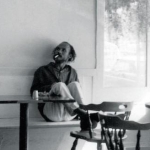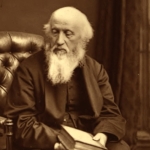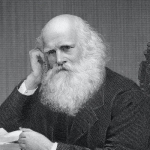In the beginning, in the wet
Warm dark place,
Straining to break out, clawing at strange cables
Hearing her screams, laughing
“Later we forgave ourselves, we didn’t know”
Some secret jazz
Shouted, wait, don’t go.
Impatient, we came running, innocent
Laughing blobs of blood & faith.
Where laughter seems out of place
So we learned to cry, pleased
They pronounce human.
The secret Jazz blew a sigh
Some familiar sound shouted wait
Some are evil, some will hate.
“Just Jazz, blowing its top again”
So we rushed & laughed.
As we pushed & grabbed
While jazz blew in the night
Suddenly they were too busy to hear a simple sound
They were busy shoving mud in men’s mouths,
Who were busy dying on the living ground
Busy earning medals, for killing children on deserted street corners
Occupying their fathers, raping their mothers, busy humans we
Busy burning Japanese in atomicolorcinemascope
With stereophonic screams,
What one hundred per cent red blooded savage, would waste precious
time
Listening to jazz, with so many important things going on
But even the fittest murderers must rest
So they sat down in our blood soaked garments,
and listened to jazz
They were shocked at the sound of life, long gone from our own
They were indignant at the whistling, thinking, singing, beating,
swinging,
They wept for it, hugged, kissed it, loved it, joined it, we drank it,
Smoked it, ate with it, slept with it
They made our girls wear it for lovemaking
Instead of silly lace gowns,
Now in those terrible moments, when the dark memories come
The secret moments to which we admit no one
When guiltily we crawl back in time, reaching away from ourselves
They hear a familiar sound,
Jazz, scratching, digging, blueing, swinging jazz,
And listen,
And feel, & die.



















Comment form: